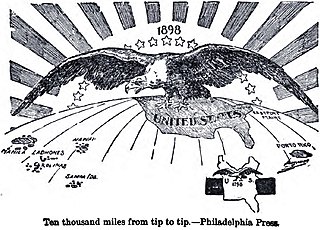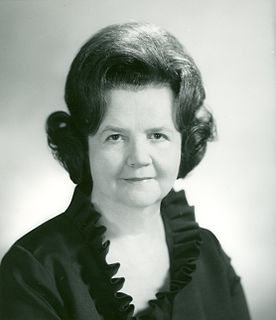Related Research Articles
The foreign policy of the United States is its interactions with foreign nations and how it sets standards of interaction for its organizations, corporations and system citizens of the United States.

Franklin Delano Roosevelt, often referred to by his initials FDR, was an American politician who served as the 32nd president of the United States from 1933 until his death in 1945. A member of the Democratic Party, he won a record four presidential elections and became a central figure in world events during the first half of the 20th century. Roosevelt directed the federal government during most of the Great Depression, implementing his New Deal domestic agenda in response to the worst economic crisis in U.S. history. As a dominant leader of his party, he built the New Deal Coalition, which defined modern liberalism in the United States throughout the middle third of the 20th century. His third and fourth terms were dominated by World War II, which ended shortly after he died in office.

Indian removal is the former United States government policy of forced displacement of self-governing tribes of Native Americans from their ancestral homelands in the eastern United States to lands west of the Mississippi River – specifically, to a designated Indian Territory. The Indian Removal Act, the key law which authorized the removal of Native tribes, was signed by Andrew Jackson in 1830. Although Jackson took a hard line on Indian removal, the law was enforced primarily during the Martin Van Buren administration. After the passage of the Indian Removal Act in 1830, approximately 60,000 members of the Cherokee, Muscogee (Creek), Seminole, Chickasaw, and Choctaw nations were forcibly removed from their ancestral homelands, with thousands dying during the Trail of Tears.

Martin Van Buren was an American lawyer and statesman who served as the eighth president of the United States from 1837 to 1841. A founder of the Democratic Party, he had previously served as the ninth governor of New York, the tenth United States secretary of state, and the eighth vice president of the United States. He won the 1836 presidential election with the endorsement of popular outgoing President Andrew Jackson and the organizational strength of the Democratic Party. He lost his 1840 reelection bid to the Whig nominee, William Henry Harrison, thanks in part to the poor economic conditions surrounding the Panic of 1837. Later in his life, Van Buren emerged as an elder statesman and an important anti-slavery leader who led the Free Soil Party ticket in the 1848 presidential election.

Thomas Jefferson was an American statesman, diplomat, lawyer, architect, musician, philosopher, and Founding Father who served as the third president of the United States from 1801 to 1809. He had previously served as the second vice president of the United States under John Adams between 1797 and 1801, and as the first United States secretary of state under George Washington between 1790 to 1793. The principal author of the Declaration of Independence, Jefferson was a proponent of democracy, republicanism, and individual rights, motivating American colonists to break from the Kingdom of Great Britain and form a new nation; he produced formative documents and decisions at both the state and national levels.

Thomas Woodrow Wilson was an American politician and academic who served as the 28th president of the United States from 1913 to 1921. A member of the Democratic Party, Wilson served as the president of Princeton University and as the governor of New Jersey before winning the 1912 presidential election. As President, Wilson changed the nation's economic policies and led the United States into World War I in 1917. He was the leading architect of the League of Nations, and his progressive stance on foreign policy came to be known as Wilsonianism.

John Foster Dulles was an American diplomat, lawyer, and Republican politician. He served as United States Secretary of State under President Dwight D. Eisenhower from 1953 to 1959 and was briefly a U.S. Senator for New York in 1949. He was a significant figure in the early Cold War era, advocating an aggressive stance against communism throughout the world.

Madeleine Jana Korbel Albright is an American politician and diplomat who served as the first-ever female United States Secretary of State from 1997 to 2001 under President Bill Clinton.

Condoleezza "Condi" Rice is an American diplomat, political scientist, civil servant, and professor who is the current director of the Hoover Institution at Stanford University. Rice served as the 66th United States Secretary of State from 2005 to 2009 and as the 20th United States National Security Advisor from 2001 to 2005. A member of the Republican Party, Rice was the first female African-American secretary of state and the first woman to serve as National Security Advisor. Until the election of Barack Obama as president in 2008, Rice and her predecessor, Colin Powell, were the highest-ranking African Americans in the history of the federal executive branch.

American imperialism consists of policies aimed at extending the political, economic and cultural influence of the United States over areas beyond its boundaries. Depending on the commentator, it may include military conquest, gunboat diplomacy, unequal treaties, subsidization of preferred factions, economic penetration through private companies followed by intervention when those interests are threatened, or regime change.
Neoconservatism is a political movement born in the United States during the 1960s among liberal hawks who became disenchanted with the increasingly pacifist foreign policy of the Democratic Party and with the growing New Left and counterculture of the 1960s, particularly the Vietnam protests. Some also began to question their liberal beliefs regarding domestic policies such as the Great Society. Neoconservatives typically advocate the promotion of democracy and interventionism in international affairs, including peace through strength, and are known for espousing disdain for communism and political radicalism.

Jeane Duane Kirkpatrick was an American diplomat and political scientist who played a major role in the foreign policy of the Ronald Reagan administration. An ardent anticommunist, she was a longtime Democrat who became a neoconservative and switched to the Republican Party in 1985. After serving as Ronald Reagan's foreign policy adviser in his 1980 campaign, she became the first woman to serve as United States Ambassador to the United Nations.

Anna Louise Day Hicks was an American politician and lawyer from Boston, Massachusetts, best known for her staunch opposition to desegregation in Boston public schools, and especially to court-ordered busing, in the 1960s and 1970s. A longtime member of Boston's school board and city council, she served one term in the United States House of Representatives, succeeding John William McCormack.

The United States Senate Committee on Foreign Relations is a standing committee of the U.S. Senate charged with leading foreign-policy legislation and debate in the Senate. It is generally responsible for overseeing and funding foreign aid programs; funding arms sales and training for national allies; and holding confirmation hearings for high-level positions in the Department of State. Its sister committee in the House of Representatives is the Committee on Foreign Affairs.

United States nationality law details the conditions in which a person holds United States nationality. In the United States, nationality is typically obtained through provisions in the U.S. Constitution, various laws, and international agreements. While the domestic documents often use citizenship and nationality interchangeably, nationality refers to the legal means in which a person obtains a national identity and formal membership in a nation and citizenship refers to the relationship a national has with the nation after becoming a member of it.
Conservatism in the United States is a political and social philosophy which characteristically shows respect for American traditions, republicanism, and limited federal governmental power in relation to the states, referred to more simply as limited government and states' rights. It typically supports Judeo-Christian values, moral universalism, American exceptionalism, and individualism. It is generally pro-capitalist and pro-business while opposing trade unions. It often advocates for a strong national defense, gun rights, free trade, and a defense of Western culture from perceived threats posed by communism, socialism, and moral relativism.

The United States of America, commonly known as the United States or America, is a country primarily located in North America. It consists of 50 states, a federal district, five major unincorporated territories, 326 Indian reservations, and some minor possessions. At 3.8 million square miles, it is the world's third- or fourth-largest country by total area. It borders Canada to the north and Mexico to the south. With a population of more than 331 million people, it is the third most populous country in the world. The national capital is Washington, D.C., and the most populous city is New York City.

Hillary Diane Rodham Clinton is an American politician, diplomat, lawyer, writer, and public speaker who served as the 67th United States secretary of state from 2009 to 2013, as a United States senator from New York from 2001 to 2009, and as First Lady of the United States from 1993 to 2001. Clinton became the first woman to be nominated for president of the United States by a major political party when she won the Democratic Party nomination in 2016. She was the first woman to win the popular vote in an American presidential election; however, she failed to win the Electoral College.

The Monroe Doctrine was a United States policy that opposed European colonialism in the Americas. It argued that any intervention in the politics of the Americas by foreign powers was a potentially hostile act against the United States. It began in 1823; however, the term "Monroe Doctrine" itself was not coined until 1850.
Jill S. Quadagno is Professor of Sociology at Florida State University where she holds the Mildred and Claude Pepper Eminent Scholar Chair in Social Gerontology. She has been a recipient of a Postdoctoral Fellowship from the National Science Foundation, a National Science Foundation Visiting Professorship for Women, the Distinguished Scholar Award of the ASA Section on Aging, a John Simon Guggenheim Fellowship, and an American Council of Learned Societies Fellowship. In 1994 she served as Senior Policy Advisor on the President's Bipartisan Commission on Entitlement and Tax Reform, and in 1998 she served as President of the American Sociological Association. She was elected to the Institute of Medicine in 2010.
References
| Diplomatic posts | ||
|---|---|---|
| Preceded by Michael Malinowski | United States Ambassador to Nepal 1994–1997 | Succeeded by Ralph Frank |